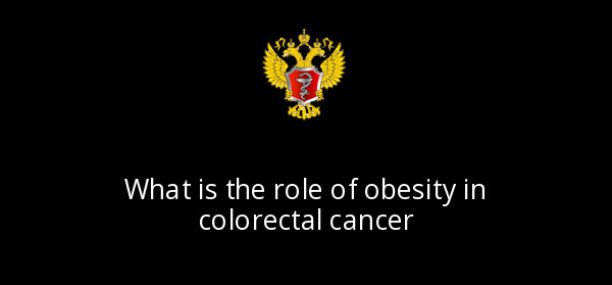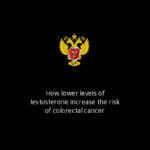What is the role of obesity in colorectal cancer?
Obesity is a well-established risk factor for colorectal cancer. The exact mechanism by which obesity contributes to the development of colorectal cancer is not fully understood, but it is thought to be related to changes in the levels of hormones and inflammatory molecules in the body, as well as alterations in the gut microbiome.
Obesity is particularly problematic in terms of colorectal cancer risk when it is centralized around the abdomen (often referred to as “visceral obesity”) rather than being distributed more evenly throughout the body. Visceral obesity is associated with higher levels of inflammation and other metabolic abnormalities that may increase the risk of cancer.
While obesity is a significant risk factor for colorectal cancer, there are also other factors that may increase the risk of developing the disease. These include:
- A family history of colorectal cancer or certain genetic syndromes such as Lynch syndrome
- A personal history of inflammatory bowel disease (such as ulcerative colitis or Crohn’s disease)
- Age (the risk of colorectal cancer increases with age)
- Certain lifestyle factors such as smoking, excessive alcohol consumption, and a diet high in processed or red meat
The role of sexual behavior in the development of colorectal cancer is less clear. While some studies have suggested that a history of multiple sexual partners or certain sexually transmitted infections (such as human papillomavirus) may increase the risk of anal cancer (which can involve the anus and/or rectum), the evidence linking sexual behavior to colorectal cancer specifically is not as strong.
Obesity is a significant risk factor for colorectal cancer, particularly when it is centralized around the abdomen.
How sexual behavior contributes to visceral obesity?
There is some evidence to suggest that certain aspects of sexual behavior may be associated with an increased risk of developing visceral obesity, which is a known risk factor for a variety of health problems including colorectal cancer. However, the exact mechanisms by which sexual behavior may contribute to visceral obesity are not yet fully understood.
One potential explanation is that sexual behavior can be associated with changes in certain hormones, such as cortisol and testosterone, which have been linked to obesity. For example, some studies have suggested that men who have more frequent ejaculations may have lower levels of testosterone, which could contribute to weight gain and obesity.
Another possible explanation is that certain types of sexual activity, particularly those that are more physically demanding, may burn more calories and contribute to weight loss or maintenance. Conversely, engaging in less physically demanding sexual activity (such as watching pornography or masturbating) may contribute to a more sedentary lifestyle and a higher risk of obesity.
It is important to note that the relationship between sexual behavior and visceral obesity is complex and may be influenced by a variety of factors including genetics, lifestyle, and overall health status. Further research is needed to better understand the potential links between sexual behavior and obesity, as well as to develop effective prevention and treatment strategies for individuals who are at increased risk of developing obesity-related health problems.
Visceral obesity, also known as central obesity or abdominal obesity, refers to the accumulation of fat around the abdominal organs, particularly within the abdominal cavity. Several factors contribute to the development of visceral obesity, including:
- Genetics: Genetic predisposition can influence an individual’s propensity to accumulate fat in the abdominal region. Certain genetic variations may affect metabolism, fat distribution, and hormone regulation, contributing to visceral obesity.
- Dietary Habits: Consumption of a high-calorie diet rich in processed foods, sugary beverages, saturated fats, and refined carbohydrates can promote fat deposition in the abdominal area. Excessive calorie intake, especially from sources that promote visceral fat accumulation, contributes to obesity.
- Sedentary Lifestyle: Lack of physical activity and sedentary behavior are major contributors to visceral obesity. Insufficient exercise and prolonged periods of sitting or inactivity lead to decreased energy expenditure and reduced fat metabolism, promoting the accumulation of visceral fat.
- Hormonal Imbalance: Hormonal factors, including imbalances in insulin, cortisol, leptin, and adiponectin levels, play a role in visceral fat accumulation. Insulin resistance, often associated with obesity and metabolic syndrome, promotes the storage of fat in visceral depots.
- Stress: Chronic stress and psychological factors can contribute to visceral obesity through hormonal dysregulation and altered eating behaviors. Stress-induced cortisol release may promote fat deposition in the abdominal area, particularly visceral fat.
- Age and Gender: Visceral obesity tends to increase with age, as metabolic rate decreases and hormonal changes occur. Additionally, men are more prone to visceral obesity than premenopausal women, although the risk increases in women after menopause.
Visceral obesity is strongly associated with an increased risk of developing colorectal cancer. Several mechanisms contribute to this association:
- Inflammation: Visceral fat is metabolically active and secretes pro-inflammatory cytokines and adipokines, contributing to chronic low-grade inflammation. Persistent inflammation in the abdominal cavity promotes colorectal carcinogenesis by creating a pro-tumorigenic microenvironment.
- Insulin Resistance and Hyperinsulinemia: Visceral obesity is often accompanied by insulin resistance and hyperinsulinemia, wherein the body’s cells become less responsive to insulin’s actions. Elevated insulin levels promote cell proliferation, inhibit apoptosis, and enhance tumor growth, fostering conditions conducive to colorectal cancer development.
- Altered Hormone Levels: Hormonal imbalances associated with visceral obesity, such as increased levels of insulin, insulin-like growth factor 1 (IGF-1), and estrogen, can promote colorectal tumor growth and progression.
- Dysregulated Adipokine Secretion: Visceral fat secretes adipokines, including leptin and adiponectin, which regulate energy homeostasis and inflammation. Dysregulated adipokine signaling in visceral obesity contributes to colorectal cancer risk through various pathways, including inflammation, angiogenesis, and cell proliferation.
Visceral obesity represents a significant risk factor for colorectal cancer due to its pro-inflammatory, pro-tumorigenic, and metabolic effects. Effective strategies for preventing and managing visceral obesity, such as adopting a healthy diet, engaging in regular physical activity, and maintaining hormonal balance, are essential for reducing colorectal cancer risk and promoting overall health
Verified by: Dr.Diab (March 29, 2024)
Citation: Dr.Diab. (March 29, 2024). What is the role of obesity in colorectal cancer. Medcoi Journal of Medicine, 3(2). urn:medcoi:article32988.














There are no comments yet
Or use one of these social networks